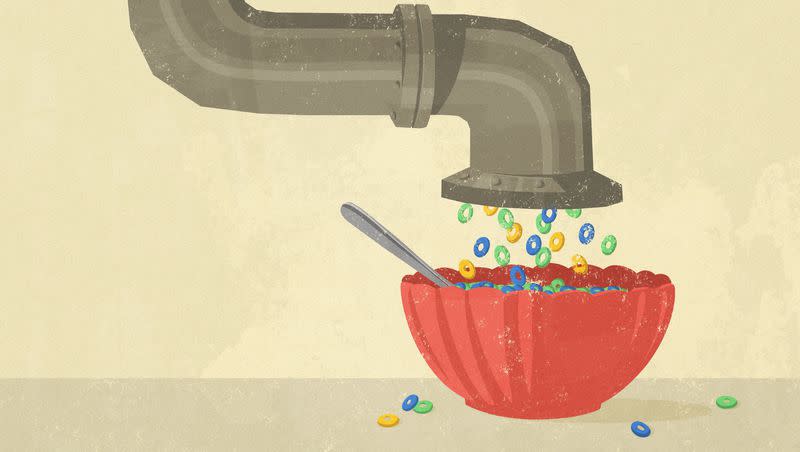Opinion: Ultra-processed foods aren’t the villain. Here’s why

- Oops!Something went wrong.Please try again later.
Ultra-processed foods. We’ve seen them in the headlines. We’ve heard the rumors that they are unhealthy, full of additives, and according to one researcher, the downfall of an American cultural staple — family dinner.
But do we really know what ultra-processed foods are?
You might think of Cheetos or gummy worms when you hear the term “ultra-processed food,” but this group also includes store-bought items like peanut butter, jam, greek yogurt, pasta sauce, cake mixes, protein powder, plant-based milks, sandwich breads, granola bars and more.
So why do we think such a broad category of foods is bad?
What are ultra-processed foods?
According to the NOVA food classification system developed by Carlos Monteiro, a researcher at the University of São Paulo, Brazil, ultra-processed foods are one of four food categories: unprocessed or minimally processed, processed culinary ingredients, processed foods, and ultra-processed foods. “Ultra-processed” means a food is created through industrial processes such as hydrolysis, hydrogenation, extrusion, moulding and pre-frying and contains ingredients derived from foods and additives that are not often found in home kitchens.
If you’re confused, Laura Thomas, author of the “Can I Have Another Snack?” newsletter and registered nutritionist, simplifies it: Ultra-processed foods are “virtually any food made in a factory that is packaged but that isn’t a processed culinary ingredient.” As the name suggests, ultra-processed just means that these foods have been created using certain processes — you can’t just pick them off a tree.
It’s good to note that “Virtually all food we eat is processed; even the things we cook at home ‘from scratch’, or eat in our favourite neighbourhood restaurants,” writes Thomas. Three of the four categories in the NOVA system are classifying different types of processed foods. The benefits of processing our foods are many, though the term “processed” has become stigmatized.
Related
What are the benefits of ultra-processed foods?
“It feels like it’s important to say very clearly that ‘processed’ is not synonymous with ‘has no nutrition,’” says Virginia Sole-Smith in a conversation with Thomas on her podcast “Burnt Toast.” In a two-part episode titled “The problem isn’t Flaming Hot Cheetos,” Sole-Smith and Thomas discuss the importance of removing this stigma around processed and ultra-processed foods.
Many ultra-processed foods are actually fortified with essential vitamins and minerals to reduce deficiencies, such as iron deficiency, calcium deficiency and vitamin D deficiency. A 2022 study published in the European Journal of Nutrition found that people who removed ultra-processed foods from their diets consumed fewer key nutrients because their foods were often not fortified.
“There are merits to processing, even ultra processing, our foods,” says Thomas. “One of the things that happens when we process food is we extend the shelf life of it, and that means that we are wasting less food overall.” Most Americans don’t have the time to go to the grocery store every single day, so foods with a longer shelf life save us time and money.
Industrial processing also “reduces food-borne pathogens ... reduces microbes that would spoil food and make things like oils turn rancid faster,” says Thomas. “It also significantly cuts down on the time and labor that it requires to cook a meal.”
Do ultra-processed foods save or destroy family dinner?
Many of us can relate to a tweet from 2022, “I’m tired of people saying ‘here’s my go to lazy meal’ and then they start chopping an onion.” One of the biggest benefits of ultra-processed foods is that, in a world where many people don’t have enough hours in the day, ultra-processed foods save time, especially in homes with young kids where both parents work.
In a paper published in 2011 by the World Nutrition Journal, Monteiro details the benefits of shared meals, stating that “meals are meant as social occasions” and that snacks should not replace meals. All things we can agree with. But his argument breaks down when he blames ultra-processed foods for destroying family dinners. “Now, as meals become displaced by ready-to-heat or ready-to-eat ultra-processed snacks, at first in the US and now in other countries, the meal is disappearing.”
Related
Foods that save us time allow us to prioritize differently each day. Some days you might have time to make a full dinner from scratch, while other days you may prioritize your child’s track meet, some extra hours at work or a home-improvement project. Ultra-processed foods give us the extra time for these priorities without skipping dinner. “Limiting the amount of time I spend cooking dinner is the thing that enables me to eat dinner with my family at night,” Sole-Smith tells Thomas on the podcast.
The goal here is not to say that ultra-processed foods should make up 100% of our diets. Ideally, we will consume a variety of different foods from all four groups. But we need to combat the stigma and judgement around ultra-processed foods with facts. Once we understand what ultra-processed foods really are, its difficult to make the claim that such a broad category of foods is, across the board, “bad.”
“Nutrition isn’t all or nothing,” writes Thomas, “there is space to eat fresh, ‘minimally processed’ foods, and fill gaps with (ultra-processed foods).” Your family dinner won’t be sidelined, and you might end up with a lower chance of nutrient deficiency.

